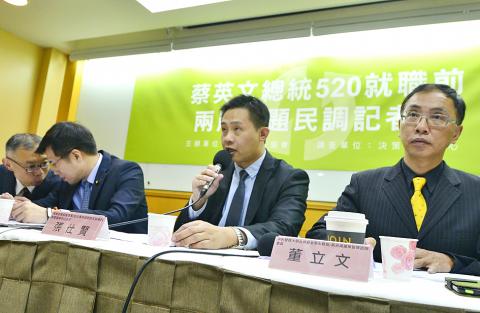Most Taiwanese do not subscribe to the “one China” policy, or the idea that Taiwan is part of China, a survey conducted by the Taiwan Cross-Strait Policy Association showed.
According to the survey, 59.7 percent of respondents said that president-elect Tsai Ing-wen (蔡英文) “should not state in her inauguration speech that both sides [of the Taiwan Strait] belong to ‘one China,’ while 22 percent said she should,” association secretary-general Anson Hung (洪耀南) told a news conference in Taipei.
“Asked if they think Tsai should give in if China openly threatens to reduce the number of Chinese tourists to Taiwan, 60.4 percent said they still believed that she should not say Taiwan and China are parts of ‘one China,’ while 24.7 percent said she should,” Hung said.

Photo: Wang Yi-sung, Taipei Times
Asked if Tsai should give in to the threat that China would suppress Taiwan’s international space, 60 percent of respondents said she should not; 57.2 percent also said she should not give in to Beijing’s threat of cutting cross-strait economic exchanges.
“The results of the survey show that, no matter how China pressures or threatens Taiwan, the majority of the public still do not agree with the idea that Taiwan and China belong to ‘one China,’” Hung said.
Democratic Progressive Party Legislator Lo Chih-cheng (羅致政) told the news conference that the results of the association’s survey are similar to those of other polls conducted by other organizations as well as the Mainland Affairs Council, and urged Beijing to review those results as well.
“Leaders of a democracy should act according to the will of the majority, and the poll shows that Beijing’s idea of ‘one China’ is unacceptable to most people in Taiwan, and it would be difficult for Tsai to go against the majority,” Lo said.
“Cross-strait relations can progress more smoothly if it remains ambiguous to a certain extent, so Beijing should not be so eager to break that ambiguity,” Lo said.
Chiu Chui-cheng (邱垂正), an associate professor at National Quemoy University’s Department of International and Mainland China Affairs, said that China often calls on Taiwan to respect the opinion of its 1.3 billion people, but “what qualification does the Chinese leadership have to make that call when it does not even respect the opinions of its people and restricts the freedom of speech?”
As Tsai insists that the core of her cross-strait policy is maintaining the “status quo” and refuses to recognize the so-called “1992 consensus,” Beijing has stepped up its calls for Tsai to abide by the “consensus,” while threatening that refusal to do so may lead to serious consequences in cross-strait exchanges.
Although Beijing did not confirm it, there have been rumors that a sharp decline in the number of Chinese tourists visiting Taiwan following Tsai’s election is a result of China’s protest over her cross-strait stance.
The poll, conducted from Monday to Wednesday, collected 1,072 valid samples. It has a confidence level of 95 percent and a margin of error of 2.99 percentage points.

NATIONAL SECURITY THREAT: An official said that Guan Guan’s comments had gone beyond the threshold of free speech, as she advocated for the destruction of the ROC China-born media influencer Guan Guan’s (關關) residency permit has been revoked for repeatedly posting pro-China content that threatens national security, the National Immigration Agency said yesterday. Guan Guan has said many controversial things in her videos posted to Douyin (抖音), including “the red flag will soon be painted all over Taiwan” and “Taiwan is an inseparable part of China,” while expressing hope for expedited “reunification.” The agency received multiple reports alleging that Guan Guan had advocated for armed reunification last year. After investigating, the agency last month issued a notice requiring her to appear and account for her actions. Guan Guan appeared as required,

A strong cold air mass is expected to arrive tonight, bringing a change in weather and a drop in temperature, the Central Weather Administration (CWA) said. The coldest time would be early on Thursday morning, with temperatures in some areas dipping as low as 8°C, it said. Daytime highs yesterday were 22°C to 24°C in northern and eastern Taiwan, and about 25°C to 28°C in the central and southern regions, it said. However, nighttime lows would dip to about 15°C to 16°C in central and northern Taiwan as well as the northeast, and 17°C to 19°C elsewhere, it said. Tropical Storm Nokaen, currently

‘NATO-PLUS’: ‘Our strategic partners in the Indo-Pacific are facing increasing aggression by the Chinese Communist Party,’ US Representative Rob Wittman said The US House of Representatives on Monday released its version of the Consolidated Appropriations Act, which includes US$1.15 billion to support security cooperation with Taiwan. The omnibus act, covering US$1.2 trillion of spending, allocates US$1 billion for the Taiwan Security Cooperation Initiative, as well as US$150 million for the replacement of defense articles and reimbursement of defense services provided to Taiwan. The fund allocations were based on the US National Defense Authorization Act for fiscal 2026 that was passed by the US Congress last month and authorized up to US$1 billion to the US Defense Security Cooperation Agency in support of the

PAPERS, PLEASE: The gang exploited the high value of the passports, selling them at inflated prices to Chinese buyers, who would treat them as ‘invisibility cloaks’ The Yilan District Court has handed four members of a syndicate prison terms ranging from one year and two months to two years and two months for their involvement in a scheme to purchase Taiwanese passports and resell them abroad at a massive markup. A Chinese human smuggling syndicate purchased Taiwanese passports through local criminal networks, exploiting the passports’ visa-free travel privileges to turn a profit of more than 20 times the original price, the court said. Such criminal organizations enable people to impersonate Taiwanese when entering and exiting Taiwan and other countries, undermining social order and the credibility of the nation’s